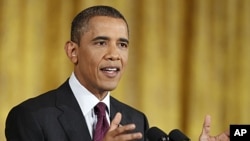In U.S. politics, much of the next month in Washington will be spent in a polarized debate over whether to raise the national debt ceiling in order to avoid default. The debate is likely to be a dress rehearsal for next year’s presidential election campaign in which the incumbent, President Barack Obama, will have to defend his economic record.
The political skirmishing in Washington over the mounting debt is intensifying with enormous stakes for President Obama, congressional Republicans and the large field of Republican presidential contenders who would like to run against the president next year.
The Obama administration warns that unless the borrowing limit of $14.3 trillion is raised by August 2, world economic markets could be thrown into turmoil and the tentative U.S. economic recovery could be undermined.
Debt agreement
Political experts say a compromise on the debt limit between the president and Republican congressional leaders could help Obama in his re-election bid next year when he faces U.S. voters unhappy with his record on the economy.
“The president came in promising recovery, promising more jobs, promising economic growth. He hasn’t delivered," noted Analyst Stuart Rothenberg on VOA’s Encounter program. "The Democrats say it is not his fault. He was dealt a bad hand. The Republicans haven’t cooperated. But in our political system, the president is almost always held accountable and the polls are showing that the voters are holding Barack Obama accountable and his numbers are falling. This is a significant problem for him.”
Obama insists that ending some tax breaks for wealthy Americans should be part of any debt agreement that would also include the deep spending cuts favored by Republicans.
At a recent news conference the president showed some impatience with Republican congressional leaders in the talks aimed at securing an agreement on raising the debt limit.
“They need to do their job. Now is the time to go ahead and make the tough choices,” the president said.
Republicans fired back at Obama for leaving Washington to raise campaign funds and speak at a rally in Pennsylvania.
Among them was former Massachusetts governor Mitt Romney, the national frontrunner for the Republican Party’s presidential nomination next year.
“He shouldn’t leave that town until he has an understanding of what it is going to take to get this economy going again,” Romney said.
Central election issue
There is little doubt that the domestic economy looms as the central issue in next year’s U.S. presidential election, and even prominent Democrats worry about the possibility that the economy will continue to sputter into 2012.
Former Pennsylvania governor Ed Rendell spoke on a conference call organized by the Democratic National Committee to rebut attacks by Republican Romney.
“It is going to be a tough fight and if the Republicans put together a ticket that reflects the views of independent voters, reflects the views of moderate Republican voters, conservative Democrat voters, if they do that then it is going to be a tough race. There is no question about it and we can’t be complacent,” Rendell said.
The latest polls show President Obama running just ahead of Mitt Romney for the White House next year. The president has somewhat larger leads over the rest of the Republican presidential field.
“He [Obama] is an extremely effective campaigner. He shouldn’t be underestimated ever as the Republicans discovered to their dismay in 2008," noted David Aikman, a contributing editor with the American Spectator magazine and a regular guest on VOA’s Issues in the News program. "But he does have an economic sort of downturn, which is now weighing upon him. He can’t continually say that was all President Bush’s fault."
Polls show Democrats largely remain united behind President Obama for 2012 while Republicans are eager to turn him out of office.
Independent voters
Political analyst Bill Schneider says both parties will fiercely compete for the support of independent voters next year, a group that supported Barack Obama over Republican John McCain in 2008.
“I think Obama has the right strategy. He is trying to hold the center. The strategy is good. What is a big problem for him, of course, is the terrain. The terrain for the next election is very treacherous with the unemployment rate that high and the spike in gas prices have created a serious wave of disillusionment that the recovery is taking hold around the country,” Schneider said.
Since World War II, only three U.S. presidents have been defeated at the polls - Gerald Ford in 1976, Jimmy Carter in 1980 and George H.W. Bush in 1992. Domestic economic problems were major factors in all three defeats.




